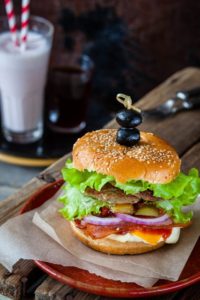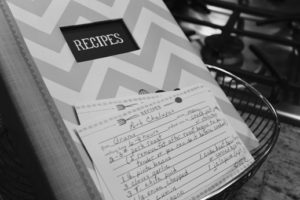 There is plenty of evidence out there that cooking and eating at home can help people lose weight and keep it off. The reason is simple; cooking at home lets us control what goes into the meal and informs our decision of how much of it to eat. We have no idea what goes into a restaurant meal and consequently underestimate how many calories we eat, by a lot. Despite plenty of evidence about the benefits of eating-in more and more meals are being consumed outside the home. Convenience and busy lifestyles are significant drivers of this growing trend. Hard to argue with convenience but I think there is more room for cooking in our busy lives than we allow ourselves to believe.
There is plenty of evidence out there that cooking and eating at home can help people lose weight and keep it off. The reason is simple; cooking at home lets us control what goes into the meal and informs our decision of how much of it to eat. We have no idea what goes into a restaurant meal and consequently underestimate how many calories we eat, by a lot. Despite plenty of evidence about the benefits of eating-in more and more meals are being consumed outside the home. Convenience and busy lifestyles are significant drivers of this growing trend. Hard to argue with convenience but I think there is more room for cooking in our busy lives than we allow ourselves to believe.
Anyone can learn to cook
I cook 99% of our meals at home. I juggle that between kids’ school, daycare, shuttle services to various sports and running a business. Most days of the week and many weekends its go go go… I cook, not because I want to be super mom, but because I am a bit of a control freak. I like knowing what is in my food and I love controlling how it tastes. My cooking is not fancy or time consuming but it suits our taste buds, nutrition needs, saves us time and money. How you ask? A little bit of inspiration and planning, ability to read instructions and some basic kitchen skills is all it takes.
Let’s start by saying that I believe that anyone can cook. Cooking at its core does not require specialized equipment, training or fancy skills. It does require ingredients, instructions, some physical effort and an understanding of your tastes. Instructions (recipes) are what provides the list of ingredients (what) and method for creating the taste and texture you desire (how much and how to), the cook provides the physical effort and personal taste.
What kind of cook are you?
 Home cooks vary in the level of skill and ways they approach cooking. Skill levels range from novice to experienced cooks. Approaches are many such as methodical cooks, competitive cooks, innovative cooks, healthy cooks, giving cooks and so on. All of us start out at novice, some in childhood and others as adults, and develop our cooking identity with experience. The type of cook we become often informs our approach to cooking and recipe selection. Methodical cooks follow recipes to a T; competitive cooks look for challenges and continually expand their skills; innovative cooks modify and invent their own creations; healthy cooks gauge recipes and methods by a set of criteria and giving cooks focus on satisfying others desires. Why does all this matter?
Home cooks vary in the level of skill and ways they approach cooking. Skill levels range from novice to experienced cooks. Approaches are many such as methodical cooks, competitive cooks, innovative cooks, healthy cooks, giving cooks and so on. All of us start out at novice, some in childhood and others as adults, and develop our cooking identity with experience. The type of cook we become often informs our approach to cooking and recipe selection. Methodical cooks follow recipes to a T; competitive cooks look for challenges and continually expand their skills; innovative cooks modify and invent their own creations; healthy cooks gauge recipes and methods by a set of criteria and giving cooks focus on satisfying others desires. Why does all this matter?
Understanding where you are in your cooking experience can make a huge difference in your success as a cook; so can the type of cook you are. There is no shortage of food inspiration out there. Thousands of recipe blogs, websites and books provide ideas and instructions making home cooking easier and tastier than ever. At the same time the sheer volume of choices can be overwhelming and confusing. On the one hand great tasting healthy recipes can be found by anyone at any time. Unfortunately all those choices can take some work to find the ones that match our skills and cooking personality.
Preparation and Execution
I think that is the main reason many people give up on home cooking before they really get started. We expect to be great cooks and forget that cooking is something you learn through experience, usually trial and error. It also has two main components, preparation and execution. Preparation is the hard part of figuring out what you need and getting it. Execution is the easy part, chopping and cooking. Recipes provide information for both parts. Ingredient list provides information on what you need to get, and the instructions what you need to do with it before you eat it. The two components require very different skills. I think that preparation and planning overwhelm many (especially new) cooks before they ever touch a cutting board. So recipes can both inspire and end fledgling cooking dreams. Let’s take a different approach. If you are a true cooking novice start with the easy part, execution, before you tackle the hard part of preparation.
Practicing Cooking Skills
 So how do you learn to execute recipe instructions without doing the preparation? Meal-kit delivery services such as Plated, Blue Apron or Hello Fresh can help. They take care of ingredient selection, pre-measure spices and provide step-by-step instructions (with pictures) allowing you to focus on putting it all together. These services not only allow you to perfect your chopping skills but explore new spice combinations and ingredients. Exploring in this way lets you build up a comfort level so you can branch out to finding your own recipes and buying your own ingredients.
So how do you learn to execute recipe instructions without doing the preparation? Meal-kit delivery services such as Plated, Blue Apron or Hello Fresh can help. They take care of ingredient selection, pre-measure spices and provide step-by-step instructions (with pictures) allowing you to focus on putting it all together. These services not only allow you to perfect your chopping skills but explore new spice combinations and ingredients. Exploring in this way lets you build up a comfort level so you can branch out to finding your own recipes and buying your own ingredients.
Planning and Preparation
Once you get comfortable in the kitchen you can move on to the preparation skill set. It is a completely different beast and can easily overwhelm anyone. Successful preparation includes finding the recipes, creating the menus and shopping lists and procuring the ingredients. There are no handy recipes or picture charts for this skill despite its importance. Here are a few thoughts:
- Recipes can make preparation easier, but only if you pick the right recipes for you
- It is important to understand your time, skill and tool constraints when picking recipes and setting up menus.
- A weekly (or longer) menu is essential to successful prep and home cooking (this one deserves its own post so stay tuned)
- Shopping lists are easy once you have a menu
- Buying ingredients off a shopping list results in less time shopping
- Buying ingredients ahead of time makes execution enjoyable
I do not believe in making life more difficult than it is. Getting comfortable in the kitchen is the first step to cooking. The next step is finding your own recipes and doing your own planning and prep. Cooking does not have to be an ordeal or a production. It can make our eating healthier and fit into busy schedules. It can help us lose weight. There are many paths to becoming a successful home cook, be it meal-kits, cooking classes or simple trial and error. The important part is enjoying the process and savoring the fruits of your labor. So if you have been thinking about getting in the kitchen make a plan, try a meal-kit service or find a new recipe and enjoy.
If you have questions about cooking, recipes, nutrition and food preparation I would love to hear from you. Contact me at Anna@ManageablePieces.com. I also encourage you to check out the Programs page for the latest in online and local in-person offerings. You can also find recipe ideas by following me on Pintrest.
